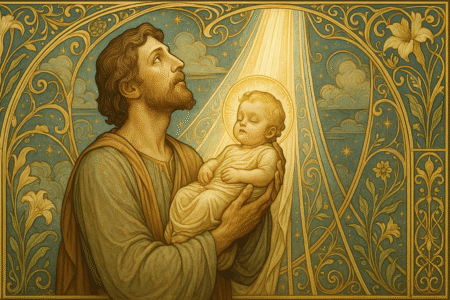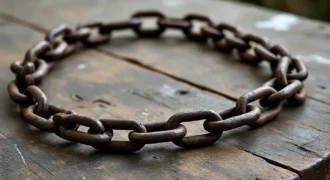Fatherhood And The Imitation of God
When my daughter was old enough to sit on her own, she would often find herself at the edge of the bed, unaware of how close she was to a great fall. I would watch her sliding down the sheets, fully compliant with the pull of gravity. Just in time, I would jump and gather her in my arms before she made contact with the hard, tiled floor. There, in my arms, she would coo and giggle, completely unaware of the danger she had been heading toward—and of how her father had protected her. When this happened, I turned to my wife and said what was echoing in my heart: “How many times must God have protected us from unseen dangers, even when we had no idea we needed saving?”
Joe Rigney, in his book Strangely Bright, writes, “Created things make eternal things perceivable. God’s own power and righteousness and beauty and wisdom and mercy are invisible attributes. We can’t see them directly. But when we see a tornado tear across the plains, we see his power. When we stand on a giant mountain, we feel the firmness and stability of his righteousness. When we watch the sun set over the Pacific Ocean, we see his beauty. When we witness the magnificent intricacy of the food chain—deer eating grass and then being eaten by lions—we see his inscrutable wisdom and mercy over all that he has made. Made things make invisible attributes visible.”1 We live in a world filled with meaning, where countless stories and lessons point us to spiritual truths. Regardless of what utilitarian materialists say, the world around us is not merely chance, matter, and atoms in aimless motion. When a father catches his falling daughter, it is more than just a collision of matter—it is a dim glimpse of our heavenly Father’s glorious fatherhood. Scripture gives us a direct example of this: “If you then, being evil, know how to give good gifts to your children, how much more will your heavenly Father give the Holy Spirit to those who ask Him?” (Luke 11:13, NASB95). Here, Jesus helps us understand the greatness of God’s fatherhood by using human fatherhood as an analogy.
This analogy works both ways. We are also to understand fatherhood by looking to God as our example, for we are called to be imitators of Him (Matthew 5:48; Luke 6:36; 1 Peter 1:16). Let’s consider some of the virtues of fatherhood that earthly fathers can learn from our heavenly Father.
Protection
“But the Lord is faithful, and He will strengthen and protect you from the evil one.” (2 Thessalonians 3:3, NASB95)
Earthly fathers are to protect their children just as our Heavenly Father does. God models His protection in various ways:
(i) God physically protects us from harm (Psalm 91:11-12).
(ii) God protects us from spiritual harm (John 10:28-29; John 6:37).
Likewise, fathers should protect their children from both kinds of danger. They are to guard them from physical harm and, more importantly, from spiritual harm. While there is no explicit passage commanding fathers to protect their children, the duty is implicit in God’s example. Fathers must protect their children spiritually by being their primary mentors, leading and guiding them according to the Word (Deuteronomy 6:6-7).
Provision
“Do not worry then, saying, ‘What will we eat?’ or ‘What will we drink?’ or ‘What will we wear for clothing?’ For the Gentiles eagerly seek all these things; for your heavenly Father knows that you need all these things. But seek first His kingdom and His righteousness, and all these things will be added to you.” (Matthew 6:31-33, NASB95)
Our Heavenly Father not only provides for our needs, but He already knows them beforehand. As fathers, we are to imitate Him in this. We should be so involved in our children’s lives that we understand their needs even before they express them. Just as God, in His loving care, anticipates and meets our needs, earthly fathers should be attentive and discerning, ensuring that their children are provided for both physically and spiritually. We are called to model Christ to our children by sacrificially loving them and providing for them. It is a great privilege to reflect the provision and care of our Heavenly Father in the way we provide for and care for our children.
Comfort
“Blessed be the God and Father of our Lord Jesus Christ, the Father of mercies and God of all comfort, who comforts us in all our affliction so that we will be able to comfort those who are in any affliction with the comfort with which we ourselves are comforted by God.” (2 Corinthians 1:3-4, NASB95)
Fathers are to be a source of comfort to their children. Paul writes in Colossians 3:21: “Fathers, do not exasperate your children, so that they will not lose heart.” He says this knowing very well that fathers can, and often do, exasperate their children. Yet, our Heavenly Father does not do this; instead, He comforts us. Earthly fathers are not meant to replace God’s comfort but rather to be conduits of it.
Presence and Involvement
“…and lo, I am with you always, even to the end of the age.” (Matthew 28:20, NASB95)
God is always with us. He is available to His children at all times and never forsakes them. As the psalmist declares:
“He who keeps you will not slumber. Behold, He who keeps Israel will neither slumber nor sleep.” (Psalm 121:3b-4, NASB95)
Unlike God, earthly fathers are not omnipotent or immutable; they need sleep and rest (Psalm 127:2). Yet, from a human standpoint, they should strive to be present and involved in their children’s lives. A father’s involvement is crucial to a child’s godly upbringing. His actions set the course for the household, and in his absence, his absence determines its course.
Discipline
“But if you are without discipline, of which all have become partakers, then you are illegitimate children and not sons.” (Hebrews 12:8, NASB95)
Hebrews 12:8 uses a human analogy to illustrate a spiritual reality. The verse does not imply that God has illegitimate children but contrasts the way fathers discipline their own sons with how God disciplines us. Because He loves us, He disciplines us for our good.
Likewise, fathers must imitate God in disciplining their children to maturity. Proverbs 13:24 says, “He who withholds his rod hates his son, But he who loves him disciplines him diligently.” This teaches that discipline is an expression of love, not hatred. A father who refuses to discipline his child, in effect, abandons him to his sinful inclinations. Yet, our Heavenly Father never does this. Even when He disciplines us, it is always for our ultimate good.
It wouldn’t be right to take a very pietistic position and say that ultimately the father doesn’t matter and all that matters is that the believer has the heavenly father. That’s because God has made it such that the father matters in the upbringing. While God is very well able to allow a child to be raised well in the absence of a father, in most cases he doesn’t. There is a deep father hunger in our culture. Most pastors, if they have done enough one-on-one counseling, can testify that, in most cases, a person’s brokenness can be traced back to an irresponsible or absent father figure. Fatherhood is of supreme importance, and that reality should make us tremble at the weight of this calling. Left to themselves, earthly fathers—being sinners—would surely fail to meet the requirements of this task.
But what a great delight that we are not left to ourselves! Our heavenly Father not only models true fatherhood for us but also strengthens and aids us in the pursuit of being godly fathers. And for those who carry wounds from fatherlessness or brokenness, the Spirit of God is able to heal their hearts, bringing restoration and wholeness. As the psalmist declares, “He heals the brokenhearted and binds up their wounds” (Psalm 147:3, NASB95). Fatherhood is a sacred calling—let us pray that God enables us to carry out this responsibility well, all the while learning to be good fathers from the perfect example of our heavenly Father.
(Originally Posted on Equip Indian Churches Blog)
1Joe Rigney, Strangely Bright: Can You Love God and Enjoy This World? (Wheaton, IL: Crossway, 2020), Pages 19-20











